|
Boycotting 4th Edition D&D
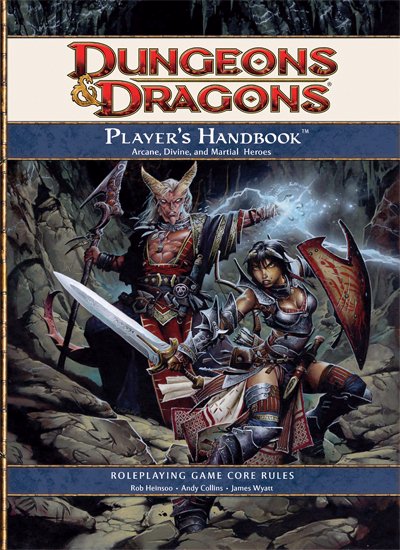
Why a Boycott?
By Charles Moffat - February 2008.
The fantasy roleplaying game Dungeons & Dragons (D&D or DnD) was originally designed by E. Gary Gygax and Dave Arneson, and first published in 1974 by the Gygax-owned company Tactical Studies Rules, Inc. (TSR). It is now owned by Wizards of the Coast (which also creates Magic the Gathering, PokeMon and a variety of collectable trading cards games), and they've decided to release a new 4th edition in June of 2008.
For Those Who Don't Know What D&D Is: The game is played around a dinner table usually, with plastic dice used to determine random aspects of the game like stats, whether a dwarf wizard dodges a dragon's fiery breath and how much damage a sword does when an elven paladin stabs the dragon. The "Dungeon Master" tells the story/plot of each adventure and the players chime in whenever it is their character's turn to attack, run away or mock the monster.
The game is also fabulously fun and addictive as it allows players to imagine worlds and stories we only wish people could make into movies more often (worlds like those in Lord of the Rings, Conan, Dragonlance's Krynn, Dark Sun, Narnia, the Golden Compass, The Forgotten Realms and Pirates of the Caribbean.
There are also modern and futuristic variations of the same game but designed for Star Wars, Star Trek, etc. So instead of a sword the characters have lightsabers and phasers and fight evil Sith lords and Borg Romulans (or whatever).
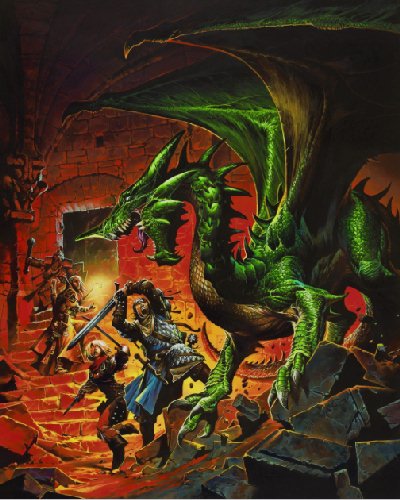
Dungeons & Dragons has gone through numerous incarnations over the years.
1974 - Dungeons & Dragons (the most basic version).
1978 - Advanced Dungeons & Dragons.
1989 - 2nd Edition Advanced Dungeons & Dragons.
2000 - 3rd Edition Dungeons & Dragons (the new owners Wizards of the Coast decided to drop the "Advanced" part).
2003 - 3.5 Dungeons & Dragons (a revised version because some players complained about certain things in 3.0).
2008 - 4th Edition Dungeons & Dragons...
2011 - 4.5 Dungeons & Dragons???
2016 - 5th???
I think you're starting to see my point.
The company has grown greedy and is looking to maximize profits by releasing more and more editions to players they know will want to buy every book they can.
It is not the greed that pisses me off however. It is the fact that people will go out and buy 4th edition, and then lo and behold 3 years later they will probably release a 4.5 version with updated rules.
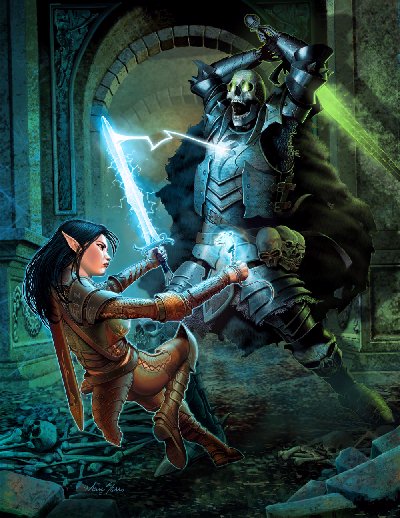
Plus, in my opinion, 3.5 was not an improvement. They dumbed the game down, made it more power-gamed, and (according to some fellow players) they've deliberately tried to make it more like the World of Warcraft computer game (which is itself based on the D&D phenomenon). So for me, I decided to boycott 3.5 as well and haven't spent a single dime on 3.5 books.
And I won't spend a dime on 4th edition either. Or 4.5. I am waiting for 5th edition in 2016, and depending on its quality, I may not buy into it either (especially if they have dumbed it down too much).
If you look at the time frame between 1st edition, 2nd and 3rd you will see they waited 11 years between 1st and 2nd, and another 11 years before releasing 3rd edition. So in theory, to be fair and consistent (like any DM should), a 4th edition shouldn't arrive until 2011 or so.
If Wizards of the Coasts wants to be making more money they should be thinking of expanding into more languages and promoting the game overseas in countries that will be interested in it.
I also think they should be doing more PR work to promote the game as is and dispel the myth that Christian groups promote that D&D is akin to satan worship. (It is a game with plastic dice and little Monopoly-like figurines made out of painted pewter or plastic, what the hell does that have to do with satan worship?)
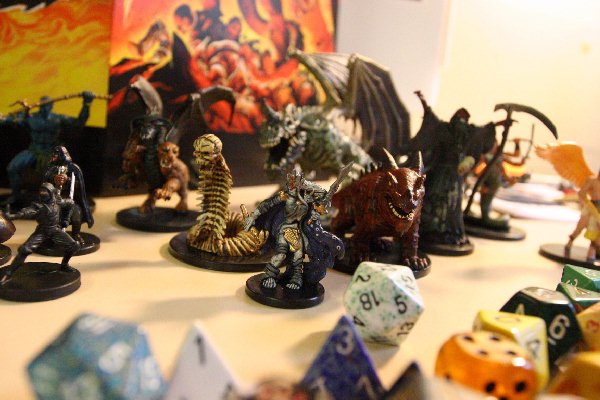
Now don't me wrong. I still love playing D&D. I currently DM a 3rd edition game and I also play in a 3.5 game.
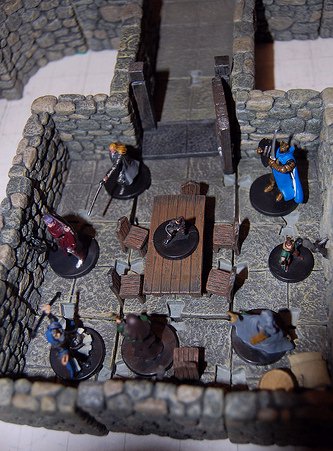
Heck, a couple of months ago I even decided to try out 1st edition (I originally started playing during the height of 2nd edition back in 1995) and it is interesting to look at how the game has evolved since 1st edition. Despite being dated it is still one of the best games I've ever been in (kudos to good DMing).
I've tried other games too, including Star Wars, Gurps, Palladium, Heroes Unlimited (mutant superheroes) and Top Secret (a superspy game). I've also tried D&D Online, which is also incredibly addictive but lacks plot and actual roleplaying. It plays more like a hack and slash game.
Wizards of the Coast says they need to make a 4th edition because 3.5 is apparently broken. Like duh. I figured that out when I first picked up the books in the store and looked at the new rules (I won't go into details, but there was a lot of stupid rule changes that they made).
Wizards also claims they need to make the changes so the online 3D version of D&D can be designed using the same rules and so they can use some new digital technology they've created, but this doesn't satisfy me as being a good answer. It seems more like a ploy to sell players extra junk.
I am not going to slam the door on 4th edition completely... I "MIGHT" buy into 4th edition if it is actually an improvement instead of the huge mistake 3.5 was and only if (this is a big "if") they have moved away from the feeling of power gaming lunacy that 3.5 has. If they do manage to make the changes, I might be interested, but I won't hold my breath.
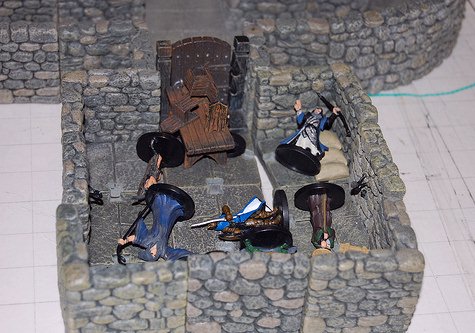
Wizards of the Coasts answers FAQ about 4th Edition
Why 4th Edition?
3.5E had so many non-core sourcebooks that you could have easily respun and/or rebalanced the material into a new set of books if you had any need to sell more material (which you presumably do, as would anyone else in the same business). Based on what has been released and what I've read, 4E will be a radical departure of standards set back in 3E which were, in turn, meant to improve the game drastically. Don't you think more work could have, and should have, been done to improve 3.5E? It seems like you're throwing the baby out with the bathwater.
Wizards of the Coast:
The design team had play-tested Dungeons and Dragons 3.5 extensively and it was clear that the game needed to evolve. Since there were things we wanted to do digitally, like the Digital Game Table and the Character builder, it became clear that we should create a new, fully integrated system, with rules that would support our online applications. There were so many system improvements that the team really felt that the time had come to revamp the game. I don't imagine that our customers would have been satisfied with a version 3.75.
How long will this edition last?
It upset quite a few folks when D&D 3.0E transitioned to 3.5E relatively soon after release, and made some people's investments in D&D become basically worthless overnight. While I appreciate that it's sometimes time to spawn a new edition that's incompatible with the old, it felt like 3.5E should have been an errata to 3.0E, rather than a totally new set of books. I understand that WotC can't commit itself to any firm "we will not release another edition for X years" guarantee, but it would be nice to hear some sort of assurance that we won't see a repeat of the 3.0E->3.5E debacle. What's the plan? What lessons have you learned?
WotC:
I don't think it would be unreasonable to argue that the transition from 3.0 to 3.5 happened a little too soon. Would Wizards of the Coast have released 3.5 if we knew at the time that 4th Edition was coming? My guess is probably not. We would like to have 4th Edition last 8 to 10 years just like previous editions.
Player's Online Component?
I know this component is still 'in the works', but I have to ask: what are you planning for the online pricing for players vs. DMs? You've said that accessing D&D Insider and the 'online tabletop' will cost between $10 and $15, but is that for everyone? I just can't see telling my players they *each* need to pay $12/month to play online, let alone shelling out $30/month for myself and my wife. Also, will I need to have a paid subscription in order to access PDFs of the 4th edition books that I buy?
WotC:
We will be announcing pricing and subscription details at the D&D Experience convention in two weeks.
Open Gaming License
With D&D 3rd Edition, we were introduced to the D20 System and the Open Gaming License, which allowed third party publishers to produce supplements for the game. Will there be something akin to this for 4th Edition? What form will it take, and will it be more or less restrictive?
WotC:
The initial 4th Edition plans for allowing third-party publication of compatible supplements have been announced, and we're currently working with a number of independent publishers to iron out the details and get them started. Our goal is to allow 3rd party publishers, both large and small, the opportunity to publish products compatible with Dungeons and Dragons 4th Edition.
Will combat be more streamlined?
At higher levels in D&D 3.5, a fight between the party and a group of enemies can easily last a couple of hours. How has combat been streamlined?
WotC:
Two significant changes to gameplay that accelerate and streamline high-level combat are the reduction in the number of dice rolls required on each turn, and the drastic simplification of monsters. No more "full attack actions" requiring handfuls of d20s. No more monster powers hiding in feats, or that require you to look somewhere else to understand what they do--monster powers are self-contained, specialized abilities appropriate to that monster's role, its tactics in a battle, and its identity in the world.
Magic Item Requirement
One of the things I dislike about 3rd edition is that at medium and high levels magic items are such a big part of a character's power. A PC has to be decorated like a Christmas tree with various magical doodads in order to be effective. Running a campaign in a world where magic items are rare or nonexistant required a lot of house rules and adjustment on the part of the DM. Will it be easier to run a low or no magic item campaign in 4e?
WotC:
We're definitely reducing the number of magic items that a typical character will carry around. Magic items aren't going away--they're a great way for characters to specialize their tactics, shore up weaknesses, and otherwise differentiate themselves from other characters--but they'll be a smaller overall portion of a character's array of special abilities. In addition, we're being clearer to the players and DM what mechanical benefits we expect all characters to derive from their array of items, which makes it easier for a DM running a "low-magic" campaign to know what his characters are missing (so that he can either take that into account by reducing monster stats, or provide the missing benefits via other methods).
D&D and WOW
It appears (to me, at least), that many of the new rules-changes mirror popular MMO's like WOW. How much influence do the designers derive from video games; and, to the extent that D&D 4th resembles WOW, is this a conscious effort to reach the MMO-generation of gamers with table-top role-play?
WotC:
Just as the design teams of most computer games draw on their experiences with Dungeons & Dragons and other tabletop games, we look to other games for inspiration and innovation. Many of us in RPG R&D play or have played MMOs and other computer games. Some of the lessons we learned about gameplay on those platforms have helped us craft a better tabletop RPG, both for current D&D players and for potential new players who either haven't yet tried D&D or haven't found previous iterations of the game to their liking.
The balance between easy and good
How do you feel you've struck a balance between a desire to simplify/streamline rules to speed play and make the game more accessible, and a desire to preserve the strategy and general goodness of the game as it exists today? Details about proposed changes that were a tough call either way would be interesting.
WotC:
The struggle between playability and tactical depth is a constant one for any game designer, and D&D is no different. We're always wrestling with the right balance between providing streamlined, intuitive play and giving players all the options they want. For example, by giving more characters customizable options for their actions in combat, we've added a dramatic level of depth (both strategic, in building your character, and tactical, in employing those options during a fight), but at the cost of increasing complexity for some characters. We think that's a net positive effect, because the lack of tactical and strategic options for fighters, rogues, and many other characters had become a glaring weakness in the game. The key is to ensure that players of different sensibilities can still find a rewarding play experience within the game's framework. A player who prefers simple options can select those and still feel like he's creating an effective character, while his buddy who thrives on complexity can load up on interesting combos without grinding the game to a halt.
New content for old Settings?
I know that some of the old settings (Ravenloft, Spelljammers, Dark Sun, Planescape) have been transitioned to other companies or have been quietly kept alive by their fans with knowledge bases and efforts at rules translations between old rulesets and 3.5. Will any of these old, orphaned settings being making a comeback in 4.0? (Planescape. Please, Planescape!) If not, are the 4.0 rules being written to make these on-going translation efforts easier?
WotC:
We appreciate the devoted fans who have continued to run campaigns in our older campaign settings. For a variety of reasons, we can't give every setting an equal amount of support, but we certainly expect to revisit older settings from time to time on D&D Insider. We constantly re-evaluate the role of older settings in our business plans and product schedules, and it's entirely possible that some of those settings may well stage a full-fledged return at some point in the future. For now, though, we're focusing on relaunching the Forgotten Realms campaign setting in August of 2008, with the Eberron campaign setting following in 2009. When we firm up any other plans, we'll certainly share those.
Negative Press
Short intro, I read a lot of fantasy and sci-fi. Play a lot of computer games. Enjoy reading up on lore and the like. But I never got into D&D. I had friends that played it but I was never into it. I tried playing it a few times and had some fun experiences. But there's always been a sort of negative stigma associated with it among ... well, the general populace. What are you doing to break free of this? Or do you embrace it? What are your thoughts & opinions on this strange negative publicity that popular movies push onto D&D players? Do you ever try to break free of that?
Complexity vs. other gaming systems
Has there been any thoughts or discussions on reducing the amount of books needed to play? Donating a bookshelf to every new edition is getting a little ridiculous for the casual gamer. I have 40+ books from first and second edition. I bought the Player's Handbook from the third edition, read the first thirty pages and went "bleh". I know it goes against the business model, but can you actually make a game that can be played with less than four books?
WotC:
The only book any player needs to play the game is the Player's Handbook. In addition, the DM will want a copy of the Dungeon Master's Guide and Monster Manual (to help him craft encounters, build adventures, and run an entertaining game). Players won't need the Dungeon Master's Guide to equip their higher-level characters, because the PH will have plenty of magic items for all levels. Players won't need the Monster Manual to adjudicate shapechanging or summoning effects, because those effects will be self-contained within the classes or powers that grant them. That said, a large number of D&D players want more options than the core rulebooks provide--so we publish additional supplements and sourcebooks to meet that desire--but the game's fully functional without them. Of course, with the new online tools provided by D&D Insider (including a full rules database), it'll be easier than ever to carry around even your whole collection of D&D books wherever you play--just log on and there they are!
DRM?
Many people are acting as if a new edition will not only obsolete their old books, it will actually prevent them from accessing the ruleset at all. Level-headed people of course regard that as silly, nobody's going to sneak into your house and burn your old books! However, with more and more importance being placed on digital content (not specifically Wizards of the Coast, but in general) ... Is the issue of whether to DRM or not, and why and how being treated very seriously within the company?
WotC:
There is still a fair amount of non-rules content in the 3.x books that is still usable with 4th Edition. The rules themselves are changing and the old rules content will be obsolete. We plan to sell digital versions of our books for use online. Our DRM philosophy is to be as unobtrusive as possible.
Character sheets?
We know that you are providing a tool for editing character sheets on your computer, although you have not specified anything else. An editable PDF sheet seems likely. However, there have been many popular tools (e.g. PCGen) that can update many aspects of data automatically based on game events, rather than numbers. Will the suite of digital tools released with 4th Edition include a tool that can maintain a character sheet that can be updated based on effects and modifications, rather than simple numeric input? If so, will it be extensible with published supplements/user-provided data?
WotC:
Our character builder application let's you build characters of any 4E class and level. It will also let you populate the sheets with content from the D&D database, and to update your characters as they grow.
Arcane/Divine Balance?
In 3.5 and even basic 3d ed, Priests were far and away more useful than wizards and sorcers. They had damage spells, could use better weapons out of the box and had a serious of buffs, combined with their armor, that made them powerful and extremely difficult to kill. At very high levels, a powerful wizard can deal great damage with delayed blast fireball and whatnot, but at that point a good cleric can throw down greater aspect of the diety, divine power and a load of other spells and turn themselves into a combat machine, plus the ability to heal and a few good damage spells. How are you going to balance the two main spellcasting types in 4th ed? Or are you going to leave things generally as they are?
WotC:
One of the most significant design goals of 4th Edition was to clarify the roles filled by each of the character classes in the game. Not only does this help prevent one class from being good at too many things--such as the cleric--but it also prevents classes from being unable to accomplish any role effectively (such as the bard or monk). For example, clerics in 4th Edition occupy the "leader" role (sometimes also known as the "healer" or "party buffer" role). Their damage output is decent, but far behind that of the wizard or rogue, and they don't have the defenses or melee-control abilities of the fighter.
Who are you trying to please?
I started playing D&D (the basic boxed set) and AD&D ages ago--first on 1st Ed. rules and eventually ponying up for 2nd Ed. My friends and I liked the game because it was easy and simple (regarding game mechanics) in the first edition, and we did enjoy some of the changes going into 2nd E. With the arrival of the 3rd Ed. rules, you lost me as a regular player, along with many of my peers. I had no desire to relearn a gaming system that, for the most part, had its rules embedded in my head. My question is this: who are you trying to please? Are you attracting any younger gamers to the fold? If not, what's the point in publishing release after release after release? The question I'm asking beneath the surface is, "Why should I care at all?"
WotC:
The "beneath the surface" answer is, "Because this edition is the most exciting and playable version of D&D that has ever been published." In order for Dungeons & Dragons to continue to thrive, it needs to retain current players while also attracting new players to the fold. Third Edition D&D succeeded wildly on both counts, and also brought thousands of lapsed D&D players back into the game (in some cases after years away from the tabletop). We have every expectation that Fourth Edition will repeat that success.
The fact that the Player's Handbook continues to be a strong-selling book years after its publication tells us that new players still enter the game every month. We also know from our RPGA programs that the game environment is full of diehard veterans from the 70s, 80s, and 90s, as well as new players trying out their first characters. But in order for us to continue to please existing players (whose preferences in gaming continue to evolve) and also attract new players (whose needs may be quite different from veteran gamers), the game must keep pace with an enormously volatile and variable marketplace.
D&D has always been a tabletop-based game, and Fourth Edition won't change that. However, we recognize that people think about games, information storage, and even social gatherings differently now than they did in 1974, and we want the new D&D to recognize and embrace those differences rather than risk becoming obsolete. So now you'll be able to access your rulebooks online via the Rules Database, craft the perfect look for your PC with the Character Visualizer, and even game with players across town or across the globe on the Digital Game Table.
At the end of the day however, we really just want to please the fantasy gamer inside all of us and feed that insatiable desire to keep the adventure fresh and exciting!
|





